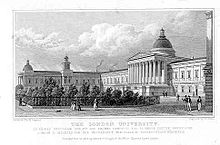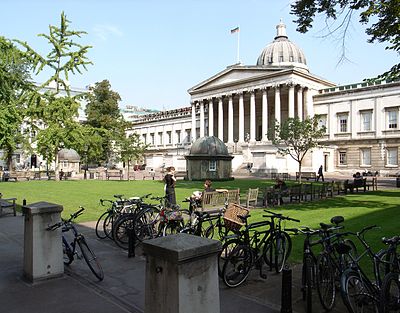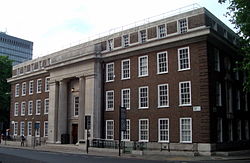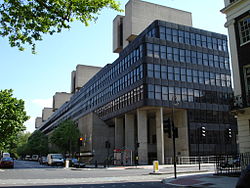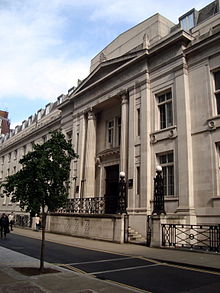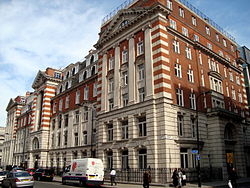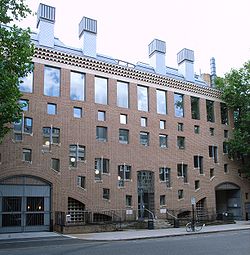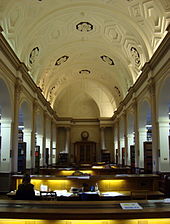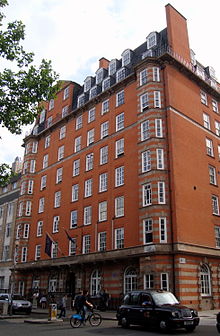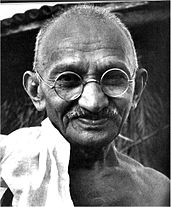- University College London
-
University College London 
Arms of University College London
(no longer used in any official capacity)Motto Cuncti adsint meritaeque expectent praemia palmae (Latin) Motto in English Let all come who by merit deserve the most reward Established 1826 Type Public Chancellor HRH The Princess Royal (University of London) Provost Prof. Malcolm Grant Admin. staff 8,000 (4,000 academic staff) Students 21,620[1] Undergraduates 11,970[1] Postgraduates 9,650[1] Location London, United Kingdom Colours Affiliations Website ucl.ac.uk 
University College London (UCL) is a public research university located in London, United Kingdom and the oldest and largest constituent college of the federal University of London.[2] Founded in 1826, UCL was the first university institution to be founded in London and the first in England to be established on an entirely secular basis, to admit students regardless of their religion and to admit women on equal terms with men.[3] UCL became one of the two founding colleges of the University of London in 1836.
UCL is organised into 10 constituent faculties, within which there are over 100 departments, institutes and research centres. UCL's main campus is located in the Bloomsbury area of Central London, with a number of institutes and teaching hospitals located elsewhere in Central London. There is a UCL campus in Doha, Qatar specialised in archaeology, conservation and museum studies, and the UCL School of Energy and Resources is based in Adelaide, Australia. UCL is a major centre for biomedical research; it is part of three of the 11 biomedical research centres established by the NHS in England and is a founding member of UCL Partners, the largest academic health science centre in Europe.[4] For the period 1999 to 2009 it was the 13th most-cited university in the world (and the most-cited in Europe).[5] UCL had a total income of £762 million in 2009/10, of which £275 million was from research grants and contracts.[6]
UCL has over 4,000 academic and research staff and 648 professors, the highest number of any British university.[7] There are currently 36 Fellows of the Royal Society, 26 Fellows of the British Academy, 10 Fellows of the Royal Academy of Engineering and 78 Fellows of the Academy of Medical Sciences amongst UCL academic and research staff.[8] There are 26 Nobel Prize winners and three Fields Medalists amongst UCL’s alumni and current and former staff, the most recent being Sir Charles K. Kao, who received the Nobel Prize for Physics in 2009.[8] UCL is ranked 20th in the world (and 3rd in Europe) in the 2011 Academic Ranking of World Universities,[9] 7th in the world (and 4th in Europe) in the 2011 QS World University Rankings[10] and 17th in the world (and 5th in Europe) in the 2011 Times Higher Education World University Rankings.[11]
UCL is a member of the Association of Commonwealth Universities, the European University Association, the G5, the League of European Research Universities, the Russell Group, UNICA and Universities UK.[12] It forms part of the 'Golden Triangle' of British universities.[13]
Contents
History
The London University as drawn by Thomas Hosmer Shepherd and published in 1827/28 (now the UCL Main Building)
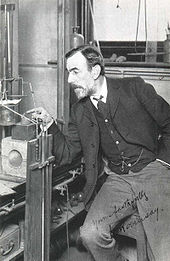 William Ramsay is regarded as a "father of noble gases".
William Ramsay is regarded as a "father of noble gases". Main article: History of University College London
Main article: History of University College London19th century
UCL was founded in 1826 under the name "London University" as a secular alternative to the religious universities of Oxford and Cambridge.[14] Although the philosopher Jeremy Bentham is commonly seen as the father of UCL, he personally took no part in its creation. Bentham's radical ideas on education and society were the inspiration to the institution's founders however, particularly the Scotsmen James Mill (1773–1836) and Henry Brougham (1778–1868).[15] In 1827 the Chair of Political Economy at London University was created, establishing the first Department of Economics in England. In 1828 the university became the first in England to offer English as a degree subject and the teaching of Classics and medicine began.
In 1830 London University founded the London University School, which was to later become University College School. In 1833 the university appointed Captain Alexander Maconochie, Secretary to the Royal Geographical Society, as the first professor of geography in the UK. In 1834 University College Hospital opened as a teaching hospital for the university medical school. In 1836, London University became formally known as "University College, London" (the comma between the words College and London was commonly used until recently), when, under a Royal Charter, it worked with the recently established King's College, London, to create the federal University of London. The Slade School of Fine Art was founded in 1871 as the result of a bequest from Felix Slade. In 1878 UCL became the first British university to admit women on equal terms to men. In 1898 William Ramsay discovered the elements krypton, neon and xenon whilst professor of chemistry at UCL.
20th century
Sir Gregory Foster became UCL’s first Provost in 1906, a post that he held for the next 23 years. In the same year the Cruciform Building was opened as the new home for University College Hospital. In 1907 the University of London was formally reconstituted with a new Royal charter, and a number of new institutions joined the federation. As part of this reorganisation each of the constituent institutions, including UCL, lost their legal independence, and henceforth all offered degrees awarded by the University of London. UCL sustained considerable bomb damage during the Second World War, including to the Great Hall and the Carey Foster Physics Laboratory. The first UCL student magazine, Pi Magazine, was published for the first time on 21 February 1946. The Institute of Jewish Studies relocated to UCL in 1959. The Mullard Space Science Laboratory was established in 1966. In 1973 UCL became the first international link to the ARPANET, the precursor of the internet, sending the world's first e-mail in the same year.
In 1977 a new charter restored UCL's legal independence, although not – at that time – the power to award its own degrees.[16] In 1986 UCL merged with the Institute of Archaeology. In 1988 UCL merged with the Institute of Laryngology & Otology, the Institute of Orthopaedics, the Institute of Urology & Nephrology and Middlesex Hospital Medical School. In 1994 the University College London Hospitals NHS Trust was established. UCL merged with the College of Speech Sciences and the Institute of Ophthalmology in 1995, the School of Podiatry in 1996 and the Institute of Neurology in 1997. In 1998 UCL merged with the Royal Free Hospital Medical School to create the Royal Free and University College Medical School (renamed the UCL Medical School in October 2008). In 1999 UCL merged with the School of Slavonic and East European Studies and the Eastman Dental Institute.
21st century
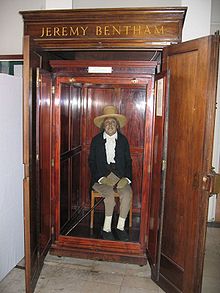 Jeremy Bentham's auto-icon is on public display in the cloisters of the UCL Main Building.
Jeremy Bentham's auto-icon is on public display in the cloisters of the UCL Main Building.
The UCL Jill Dando Institute of Crime Science, the first university department in the world devoted specifically to reducing crime, was founded in 2001. The London Centre for Nanotechnology was established in 2003 as a joint venture between UCL and Imperial College London. In 2005 UCL was again granted its own taught and research degree awarding powers and all new UCL students registered from 2007/08 qualified with UCL degrees rather than University of London degrees. The majority of continuing students who were enrolled on taught-degree programmes before the academic year 2007/08 were given the choice of whether to receive a UCL degree or a University of London degree. Also in 2005 a major new 76,000 m² building was opened for University College Hospital on Euston Road, and the UCL Ear Institute was opened on Gray's Inn Road adjacent to the Royal National Throat Nose and Ear Hospital. Another major campus addition was the opening of the award-winning 16 Taviton Street building – purpose-built as the home for the now UCL School of Slavonic and East European Studies (SSEES), following the University of London School's merger with UCL.
UCL merged with the Institute of Child Health in 2006, which became the largest division of the newly formed Faculty of Biomedical Sciences. In 2007 the UCL Cancer Institute was opened in the newly constructed Paul O'Gorman Building. In August 2008 UCL formed UCL Partners, the largest academic health science centre in Europe, with Great Ormond Street Hospital for Children NHS Trust, Moorfields Eye Hospital NHS Foundation Trust, Royal Free Hampstead NHS Trust and University College London Hospitals NHS Foundation Trust.[17] In 2008 UCL became the first UK university to sign agreements for a campus in Australia, establishing the UCL School of Energy & Resources, Australia in Adelaide.[18] In 2009, UCL announced that it would join some of the other elite institutions of Higher Education in the United Kingdom, such as Cambridge and LSE by implementing the requirement of an A* at A Level for undergraduates to be admitted to some of its most popular courses.
In 2009, an alliance was formed between UCL, Yale and both universities’ affiliated hospitals to conduct research focused on the direct improvement of patient care—a growing field known as translational medicine. Yale's President Richard Levin noted that Yale has hundreds of other partnerships across the world, but "no existing collaboration matches the scale of the new partnership with UCL".[19] The first joint master's degree has been set up, and a joint PhD programme is in the pipeline. "If we do things right, that will be the best biological PhD programme in the world," said Michael Simons, Robert W. Berliner Professor of Medicine at Yale .[20]
As part of the protests against the UK Government's plans to increase student fees, around 200 students occupied the Jeremy Bentham Room and part of the Slade School of Fine Art for over two weeks during November and December 2010.[21][22] The university successfully obtained a court order to evict the students but stated that it did not intend to enforce the order if possible.[22] It was decided on 13 May 2011, after a consultation and development process, that the School of Pharmacy, University of London would merge with UCL.[23]
Campus
UCL is primarily based in the Bloomsbury area of central London. The main campus is located around Gower Street and includes the biology, chemistry, economics, engineering, geography, history, languages, mathematics, philosophy, politics and physics departments, the preclinical facilities of the UCL Medical School, the London Centre for Nanotechnology, the Slade School of Fine Art, the UCL Union, the main UCL Library, the UCL Science Library, the Bloomsbury Theatre and the Petrie Museum of Egyptian Archaeology. Close by in Bloomsbury are the UCL Cancer Institute, the UCL Ear Institute, the UCL Eastman Dental Institute, the UCL Faculty of the Built Environment (The Bartlett), the UCL Faculty of Laws, the UCL Institute of Archaeology, the UCL Institute of Child Health, the UCL Institute of Neurology, the UCL School of Slavonic and East European Studies and University College Hospital.[24]
Elsewhere in central London are the UCL Institute of Ophthalmology (based in Clerkenwell), the Windeyer Institute (based in Fitzrovia), the UCL Institute of Orthopedics and Musculoskeletal Science (based in Stanmore), The Royal Free Hospital and the Whittington Hospital campuses of the UCL Medical School, and a number of other teaching hospitals. The Department of Space and Climate Physics (Mullard Space Science Laboratory) is based in Holmbury St Mary, Surrey and the UCL School of Energy and Resources is based in Adelaide, Australia.[25] Since September 2010 UCL has been running a University Preparatory Certificate course in maths and physics at Nazarbayev University in Astana, Kazakhstan.[26]
A number of important institutions are based near to the main campus, including the British Library, the British Medical Association, the British Museum, Cancer Research UK, the Institute for Fiscal Studies, the Medical Research Council, RADA, the Royal Academy of Art, the Royal Institution and the Wellcome Trust. Many University of London schools and institutes are also close by, including Birkbeck, University of London, the Institute of Education, London Business School, the London School of Hygiene & Tropical Medicine, the Royal Veterinary College, the School of Advanced Study, the School of Oriental and African Studies, The School of Pharmacy and the Senate House Library. The nearest London Underground station is Euston Square, with Goodge Street, Russell Square and Warren Street all nearby. The mainline railway stations at Euston, King's Cross and St Pancras are all within walking distance.
Notable buildings
Notable UCL buildings include:
- The UCL Main Building, including the Octagon, Quad, Cloisters and the Wilkins building designed by William Wilkins
- Alexandra House, 17 Queen Square (home to the UCL Institute of Neurology and the Gatsby Computational Neuroscience Unit)
- 26 Bedford Way (home to the UCL Language Centre and parts of the Division of Psychology and Language Sciences, and Geography Department)
- Bentham House, Endsleigh Gardens (home to the UCL Faculty of Laws)
- Christopher Ingold Building, 20 Gordon Street (home to the Department of Chemistry)
- The Cruciform Building, Gower Street (home to the preclinical facilities of the UCL Medical School and the Wolfson Institute of Biomedical Sciences, previously home to University College Hospital)
- 17–19 Gordon Street (home to the London Centre for Nanotechnology)
- 25 Gordon Street (home to the UCL Union)
- Paul O'Gorman Building, 72 Huntley Street (home to the UCL Cancer Institute)
- Roberts Building, 1–19 Torrington Place (home to the UCL Faculty of Engineering Sciences)
- Rockefeller Building, 21 University Street (home to parts of the UCL Medical School)
- 16 Taviton Street (home to the UCL School of Slavonic and East European Studies)
- University College Hospital, 235 Euston Road
- The Bloomsbury Theatre, 15 Gordon Street
-
The UCL Main Building is the centre of the UCL campus
-
The College Cloisters inside the UCL Main Building
-
The Main Quad in front of the UCL Main Building
-
The Flaxman Gallery, Main library, a collection of sculptures and paintings by artist John Flaxman
-
University College Hospital, 235 Euston Road
Organisation and administration
Although UCL voluntarily remains a constituent college of the University of London it is in most ways comparable with free-standing, self-governing and independently funded universities, and it awards its own degrees.[27]
The current Provost and President of UCL is Professor Malcolm Grant.[28]
Faculties and departments
See also: Category:Departments of University College LondonUCL’s research and teaching is organised within a network of faculties and academic departments. Faculties and academic departments are formally established by the UCL Council, the governing body of UCL, on the advice of the Academic Board, which is UCL’s senior academic authority.
UCL currently has the following 10 constituent faculties:[29]
- UCL Faculty of Arts and Humanities
- UCL Faculty of Brain Sciences
- UCL Faculty of the Built Environment (The Bartlett)
- UCL Faculty of Engineering Sciences
- UCL Faculty of Laws
- UCL Faculty of Life Sciences
- UCL Faculty of Mathematical and Physical Sciences
- UCL Faculty of Medical Sciences (incorporating the UCL Medical School)
- UCL Faculty of Population Health Sciences
- UCL Faculty of Social and Historical Sciences
The UCL School of Slavonic and East European Studies exists as an academic unit outside of the faculty structure.
In order to facilitate greater interdisciplinary interaction in research and teaching UCL has also established three strategic faculty groupings:
- UCL School of Life and Medical Sciences (comprising the Faculties of Brain Sciences, Life Sciences, Medical Sciences and Population Health Sciences)
- UCL School of the Built Environment, Engineering and Mathematical and Physical Sciences (comprising the UCL Faculty of the Built Environment, UCL Faculty of Engineering Sciences and UCL Faculty of Mathematical & Physical Sciences)
- UCL Faculty of Arts & Humanities, UCL Faculty of Laws, UCL Faculty of Social & Historical Sciences and the UCL School of Slavonic & East European Studies.
Finances
In the financial year ended 31 July 2010, UCL had total income (including share of joint ventures) of £762.4 million (2008/09 – £719.4 million) and total expenditure of £732.4 million (2008/09 – £707.5 million).[30] Key sources of income included £275.1 million from research grants and contracts (2008/09 – £254.3 million), £201.0 million from Funding Council grants (2008/09 – £209.9 million), £150.5 million from academic fees and support grants (2008/09 – £126.7 million) and £5.0 million from endowment and investment income (2008/09 – £8.2 million).[30] During the 2009/10 financial year UCL had a capital expenditure of £40 million (2008/09 – £66 million).[30]
At year end UCL had endowments of £67.9 million (2008/09 – £57.2 million) and total net assets of £640.3 million (2008/09 – £598.0 million).[30]
Logo, arms and colours
Whereas most universities primarily use their logo on mundane documents but their coat of arms on official documents such as degree certificates, UCL exclusively uses its logo.[31] UCL does have a coat of arms however, which depicts a raised bent arm dressed in armour holding a green upturned open wreath.[32]
The blazon of these arms is:
Purpure, on a wreath of the colours Argent and Blue Celeste, an arm in armour embowed Argent holding an upturned wreath of laurel Vert, beneath which two branches of laurel Or crossed at the nombril and bound with a bowed cord Or, beneath the nombril a motto of Blue Celeste upon which Cuncti adsint meritaeque expectent praemia palmae.[33]
UCL's traditional sporting and academic colours of purple and light blue are derived from the arms.
Academics
UCL has hundreds of research and teaching partnerships, including around 150 research links and 130 student-exchange partnerships with European universities.[3] Students from more than 150 countries study at UCL, with non-British students making up almost a third of the student body.[3]
Faculty and staff
As at October 2009, UCL had 4,078 academic and research staff across its (then) eight faculties:[34]
Faculty Number of staff[34] UCL Faculty of Arts and Humanities 180 UCL Faculty of Biomedical Sciences 1,971 UCL Faculty of the Built Environment (The Bartlett) 136 UCL Faculty of Engineering Sciences 391 UCL Faculty of Laws 62 UCL Faculty of Life Sciences 591 UCL Faculty of Mathematical and Physical Sciences 445 UCL Faculty of Social and Historical Sciences 292 UCL has the highest number of professors of any university in the UK, with 648 established and personal chairs.[7] There are currently 36 Fellows of the Royal Society, 26 Fellows of the British Academy, 10 Fellows of the Royal Academy of Engineering and 78 Fellows of the Academy of Medical Sciences amongst UCL academic and research staff.[8]
Research
UCL has made cross-disciplinary research a priority and orientates its research around four "Grand Challenges".[35] According to Professor David Price, Pro-Provost for Research: "We believe we have a moral obligation to make a difference to global problems, and to combine the knowledge that our research generates to develop wisdom that can be applied in each of the four Grand Challenges: Global Health, Sustainable Cities, Intercultural Interaction and Human Wellbeing".[36]
According to a ranking of universities produced by SCImago Research Group, UCL is ranked 12th in the world (and 1st in Europe) in terms of total research output.[37] According to data released in July 2008 by ISI Web of Knowledge, UCL is the 12th most-cited university in the world (and most-cited in Europe). The analysis covered citations from 1 January 1998 to 30 April 2008, during which 46,166 UCL research papers attracted 803,566 citations. The number of citations generated by academic publications is an important indication of institutional importance and influence. The report covers citations in 21 subject areas and the results revealed some of UCL's key strengths:
- in Clinical Medicine – 1st outside North America[38]
- in Neuroscience & Behaviour – 1st outside North America and 2nd in the world
- in Psychiatry/Psychology – 2nd outside North America
- in Immunology – 2nd in Europe
- in Pharmacology & Toxicology – 1st outside North America and 4th in the world
- in Social Sciences, General – 1st outside North America[39]
According to a separate analysis by ISI Web of Knowledge, for the period January 2000 to August 2010 UCL was ranked 16th in the world (and 2nd in Europe) for citations per paper in engineering.[40]
In the Times Higher Education ranking of research council awards 2008-9 UCL is shown to have won the most research awards with 174 awards amounting to £81,365,000. In second place Cambridge won 162 awards amounting to £74,263,000. In third place Oxford won 153 awards amounting to £54,750,000. This is thought to be the first time that a university other than Cambridge or Oxford has headed the table.
There are currently approximately 3,000 PhD students working at UCL.
Medicine
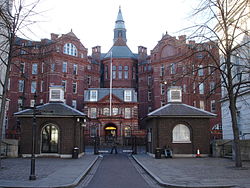 The Cruciform Building on Gower Street houses the preclinical facilities of the UCL Medical School; it was previously the main building of University College Hospital
The Cruciform Building on Gower Street houses the preclinical facilities of the UCL Medical School; it was previously the main building of University College Hospital
UCL has offered courses in medicine since 1834 but the current UCL Medical School developed from mergers with the medical schools of the Middlesex Hospital (founded in 1746) and The Royal Free Hospital (founded as the London School of Medicine for Women in 1874).[41] Clinical medicine is primarily taught at The Royal Free Hospital, University College Hospital and the Whittington Hospital, with other associated teaching hospitals including the Eastman Dental Hospital, Great Ormond Street Hospital, Moorfields Eye Hospital, the National Hospital for Neurology and Neurosurgery and the Royal National Throat, Nose and Ear Hospital.
UCL is a major centre for biomedical research. It is a member of three of the 11 biomedical research centres established by the NHS in England – the UCLH/UCL Comprehensive Biomedical Research Centre, the Moorfields Eye Hospital/UCL Institute of Ophthalmology Biomedical Research Centre and the Great Ormond Street Hospital/UCL Institute of Child Health Biomedical Research Centre.[42] It is also a founding member of UCL Partners, the largest academic health science centre in Europe with a turnover of approximately £2 billion.[4] UCL has joined with the Medical Research Council, Cancer Research UK and the Wellcome Trust to establish the Francis Crick Institute, a new £600 million medical research centre to be based next to St Pancras railway station and planned to open in 2015.[43] It will be one of the world’s largest medical research centres, housing 1,250 scientists.[44]
Foundation programmes
UCL runs intensive one-year foundation courses that lead to a variety of degree programmes at UCL and other top UK universities. Called the UCL University Preparatory Certificate (UPC), the courses are targeted at international students of high academic potential whose education systems in their own countries usually do not offer qualifications suitable for direct admission.
There are two pathways. One in science and engineering called the UPCSE; and one in the humanities called UPCH.[45]
Admissions
Admission to UCL is highly selective; many of UCL's courses require three A grades at A Level, or a grade equivalent of 6,6,6 on higher level subjects on the International Baccalaureate Program.
Due to a very high proportion of applicants receiving the highest school grades, UCL,[46] along with institutions such as Imperial College London and the University of Cambridge[47] was one of the first universities in the UK to make use of the A* grade at A-Level (introduced in 2010) for admissions, particularly for very oversubscribed courses such as Economics, Mathematics, Medicine, History, Psychology, and European Social and Political Studies.
Rankings
Rankings ARWU[48]
(2011/12, national)3 ARWU[48]
(2011/12, world)20 QS[10]
(2011/12, national)4 QS[10]
(2011/12, world)7 THE[49]
(2011/12, national)4 THE[49]
(2011/12, world)17 Complete/The Independent[50]
(2012, national)7 The Guardian[51]
(2012, national)5 The Sunday Times[52]
(2012, national)7 The Times[53]
(2012, national)5 In the 2011 Academic Ranking of World Universities, UCL is ranked 20th overall in the world (and 3rd in Europe),[9] 10th in the world (and 3rd in Europe) for Clinical Medicine & Pharmacy,[54] and 17th in the world (and 4th in Europe) for Life & Agricultural Sciences.[55]
In the 2011 QS World University Rankings, UCL is ranked 7th overall in the world (and 4th in Europe).[10] In the subject tables it is ranked 20th in the world (and 5th in Europe) for Arts and Humanities,[56] 47th in the world (and 12th in Europe) for Engineering & Technology,[57] 17th in the world (and 4th in Europe) for Life Sciences and Medicine,[58] 39th in the world (and 11th in Europe) for Natural Sciences[59] and 27th in the world (and 4th in Europe) for Social Sciences & Management.[60]
In the 2011-2012 Times Higher Education World University Rankings, UCL is ranked 17th overall in the world (and 5th in Europe).[11] In the subject tables it is ranked 8th in the world (and 3rd in Europe) for Arts and Humanities,[61] 7th in the world (and 4th in Europe) for Clinical, Pre-Clinical and Health,[62] 27th in the world (and 8th in Europe) for Engineering and Technology,[63] 11th in the world (and 4th in Europe) for Life Sciences,[64] 38th in the world (and 11th in Europe) for Physical Sciences,[65] and 8th in the world (and 2nd in Europe) for Social Sciences.[66] In the 2011 Times Higher Education World Reputation Rankings, UCL is ranked 19th overall in the world (and 4th in Europe).[67]
UCL is consistently one of the top multi-faculty universities in UK university rankings. UCL is ranked first in the UK for its staff/student ratio in The Times Good University Guide, The Sunday Times University Guide and The Guardian University Guide.[3] In The Guardian University Guide subject tables, UCL is ranked first for Art and Design and Psychology and second for Archaeology, English and Philosophy.[68]
UCL is ranked 20th in the world in the 2011 300 Best World Universities human competitiveness index & analysis produced by Human Resources & Labor Review and published in Chasecareer Network.[69] In a ranking of universities' international reputations produced by The Guardian in 2009, UCL placed 3rd in the UK (behind Oxford and Cambridge).[70] In 2011, UCL was ranked 12th globally (and 3rd in the Europe) in a survey of business leaders at top companies carried out by The New York Times.[71]
Libraries
The UCL library system comprises 16 libraries located across several sites within the main UCL campus and across Bloomsbury, linked together by a central networking catalogue and request system called eUCLid.[72][73] The libraries contain a total of over 1.5 million books.[74] The largest library is the UCL Main Library, which is located in the UCL Main Building and contains collections relating to the arts and humanities, economics, history, law and public policy.[72] The second largest library is the UCL Science Library, which is located in the DMS Watson Building on Malet Place and contains collections relating to anthropology, engineering, geography, life sciences, management and the mathematical and physical sciences.[72] Other libraries include the UCL Bartlett Library (architecture and town planning), the Cruciform Library (general clinical and medical sciences), the UCL Eastman Dental Institute Library (oral health sciences), the UCL Institute of Archaeology Library (archaeology and egyptology), the UCL Institute of Neurology Rockefeller Medical Library (neurosurgery and neuroscience), the Joint Moorfields Eye Hospital & the UCL Institute of Ophthalmology Library (biomedicine, medicine, nursing, ophthalmology and visual science), the UCL Language & Speech Science Library (audiology, communication disorders, linguistics & phonetics, special education, speech & language therapy and voice) and the UCL School of Slavonic and East European Studies Library (the economics, geography, history, languages, literature and politics of Eastern Europe).[72]
UCL staff and students have full access to the main libraries of the University of London—the Senate House Library and the libraries of the Institutes of the School of Advanced Study—which are located close to the main UCL campus in Bloomsbury.[75] These libraries contain over 3.7 million books and focus on the arts, humanities and social sciences.[74] The British Library, which contains around 14 million books, is also located close to the main UCL campus.
Since 2004 UCL Library Services has been collecting the scholarly work of UCL researchers to make it freely available on the internet via an open access repository known as UCL Eprints.[76][77] The intention is that material curated by UCL Eprints will remain accessible indefinitely.[76]
Museums and collections
UCL's Special Collections contains UCL's collection of historical or culturally significant works. It is one of the foremost university collections of manuscripts, archives and rare books in the UK.[78] It includes collections of medieval manuscripts and early printed books, as well as significant holdings of 18th-century works, and highly important 19th- and 20th-century collections of personal papers, archival material, and literature, covering a vast range of subject areas. Archives include the Latin American archives, the Jewish collections and the George Orwell Archive.[79] Collections are often displayed in a series of glass cabinets in the Cloisters of the UCL Main Building.[80]
The most significant works are housed in the Strong Rooms. The special collection includes first editions of Isaac Newton's Principia, Charles Darwin's On the Origin of Species and James Joyce's Ulysses . The earliest book in the collection is The crafte to lyve well and to dye well, printed in 1505.[81]
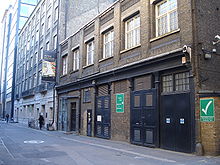 The current main building of the Petrie Museum of Egyptian Archaeology which is expected to move into the Panopticon building upon its completion
The current main building of the Petrie Museum of Egyptian Archaeology which is expected to move into the Panopticon building upon its completion
UCL is responsible for several museums[82] and collections in a wide range of fields across the arts and sciences:
- Petrie Museum of Egyptian Archaeology: one of the leading collections of Egyptian and Sudanese archaeology in the world. Open to the public on a regular basis.[83]
- Grant Museum of Zoology And Comparative Anatomy: a diverse Natural History collection covering the whole of the animal kingdom. Includes rare dodo and quagga skeletons. A teaching and research collection, it is named after Robert Edmund Grant, UCL's first professor of comparative anatomy and zoology from 1828, now mainly noted for having tutored the undergraduate Charles Robert Darwin at the University of Edinburgh in the 1826–1827 session. Open at limited fixed times and by appointment.[84]
- Geology Collections: founded around 1855. Primarily a teaching resource and may be visited by appointment.[85]
- Art Collections: these date from 1847 when a collection of sculpture models and drawings of the Neo-classical artist John Flaxman was presented to UCL. There are over 10,000 pieces dating from the 15th century onwards including drawings by Turner, etchings by Rembrandt, and works by many leading 20th century British artists. The works on paper are displayed in the Strang Print Room, which has limited regular opening times. The other works may be viewed by appointment.[86]
- Institute of Archaeology Collections: Items include prehistoric ceramics and stone artefacts from many parts of the world, the Petrie collection of Palestinian artefacts, and Classical Greek and Roman ceramics. Visits by appointment only.[87]
- Ethnography Collections: This collection exemplifying Material Culture, holds an enormous variety of objects, textiles and artefacts from all over the world. Visits by appointment only.[88]
- Galton Collection: The scientific instruments, papers and personal memorabilia of Sir Francis Galton. Housed in the department of biology. Visits by appointment only.[89]
- Science Collections: Diverse collections primarily accumulated in the course of UCL's own work, including the operating table on which the first anaesthetic was administered. Items may be a viewed by appointment.[90]
- The Flaxman Gallery: a series of plaster casts of full-size details of sculptures by the Neo-classical sculptor John Flaxman, is located inside the Main Library under the central dome of the UCL Main Building.[91]
Student life
UCL Union
Main article: University College London UnionFounded in 1893, the UCL Union has a credible claim to be the oldest students' union in England.[16] UCL Union operates both as the representative voice for UCL students, and as a provider of a wide range of services. It is democratically controlled through General Meetings and referendums, and is run by elected student officers. The Union has provided a prominent platform for political campaigning of all kinds in recent years. It also supports a range of services, including numerous clubs and societies, sports facilities, an advice service, and a number of bars, cafes and shops.[92]
There are currently over 150 clubs and societies under the umbrella of the UCL Union, including:[93]
- UCL Bloomsbury Fitness (a fitness centre)
- University College London Boat Club (both Men's and Women's clubs)
- Pi Media[94] (responsible for Pi Magazine and Pi Newspaper, UCL's official student publications)
- UCL Cross Country and Athletics Club
- University College London Dramatic Society
- UCL Rugby Club (both Men's and Women's as well as Medical School clubs)
- The Cheese Grater (a student magazine containing a mix of news investigations and humorous items)
Notable UCL Union-supported campaigns have included:
- UCLU Free Education Campaign (a campaign for the return of free and non-marketised higher education)
- The London Living wage Campaign (a campaign for a basic minimum wage for all UCL staff)
- Disarm UCL (a campaign which successfully persuaded UCL to not invest in defence companies)
- Save UCL (this name has been used by two campaigns: one in 2006 which opposed a merger between UCL and Imperial College London in 2006, and a more recent one against education cuts)
Student housing
Main article: Halls of residence at University College LondonAll single first-year undergraduate students entering UCL for the first time and requiring accommodation are generally guaranteed a place. Graduate students may apply for accommodation but places are limited. The majority of second and third-year undergraduate students and graduate students find their own accommodation in the private sector.
UCL's student housing includes:
- Arthur Tattersall House (115–131 Gower Street)
- Astor College (99 Charlotte Street)
- Campbell House East and West (Taviton Street)
- Ifor Evans & Max Rayne Student Residences (109 Camden Road)
- Frances Gardner House and Langton Close (Gray's Inn Road)
- John Tovell House (89 & 93–7 Gower Street)
- John Dodgson House (Bidborough Street)
- Prankerd House (195 North Gower Street)
- Ramsay Hall and Ian Baker House Student Residences (Maple Street)
- Schafer House Student Residence (Drummond Street)
- James Lighthill House (Pentonville Road)
- Goldsmid House (Gillingham Street)
There is limited UCL accommodation available for married students and those with children at Bernard Johnson House, Hawkridge, Neil Sharp House and the University of London's Lilian Penson Hall.[95]
UCL students are eligible to apply for places in the University of London intercollegiate halls of residence.[96] The halls are:
- Canterbury Hall, Commonwealth Hall, College Hall, Connaught Hall, Hughes Parry Hall and International Hall near Russell Square in Bloomsbury
- Lillian Penson Hall (postgraduates only) in Paddington
- Nutford House in Marble Arch
Some students are also selected to live in International Students House, London.
Rivalry with King's College London
Main article: Student RagsUCL has a long-running, mostly friendly, rivalry with King's College London (King's), which has historically been known as "Rags".[97] UCL is often referred to by students from King's as the "Godless Scum of Gower Street", in reference to a comment made at the founding of King's, which was based on Christian principles. UCL students refer to King's as "Strand Polytechnic" in a similar attitude.
The King's' mascot, Reggie the Lion, went missing in the 1990s and was recovered after being found dumped in a field. It was restored at the cost of around £15,000 and then placed on display in the students' union.[98] It is in a glass case and filled with concrete to prevent theft, particularly by UCL students who once castrated it. In turn, King's' students are also believed to have once stolen Phineas, a UCL mascot.[99] It is often claimed that King's' students played football with the embalmed head of Jeremy Bentham. Although the head was indeed stolen, the football story is a myth or legend which is unsupported by official UCL documentation about Bentham available next to his display case (his Auto Icon) in the UCL cloisters. The head is now kept in the UCL vaults.[100]
Notable people
Main article: List of University College London peopleSee also: List of Nobel laureates affiliated with University College London and List of University College London people in the Law26 Nobel prizes have been awarded to UCL academics and students (fourteen of which were in Physiology & Medicine) as well as three Fields Medals.[101][102]
Notable alumni
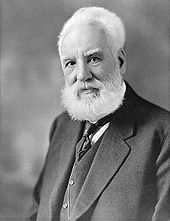 Alexander Graham Bell, whose inventions included the first practical telephone.
Alexander Graham Bell, whose inventions included the first practical telephone.
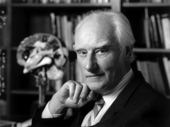 Co-discoverer of DNA structure, Francis Crick, attended University College
Co-discoverer of DNA structure, Francis Crick, attended University College
UCL alumni include the "Father of the Nation" of both India and Kenya, the inventor of the telephone, one of the co-discoverers of the structure of DNA, and all of the members of the band Coldplay.
Artists include Sir William Coldstream (realist painter), Antony Gormley (sculptor), Augustus John (painter, draughtsman and etcher), Gerry Judah (artist and designer), Ben Nicholson (abstract painter) and Sir Eduardo Paolozzi (sculptor and artist).
Authors include Edith Clara Batho, Raymond Briggs, Robert Browning, G. K. Chesterton, David Crystal, Stella Gibbons, Clive Sansom, Marie Stopes and Rabindranath Tagore.
Business people include Lord Digby Jones (Director-General of the Confederation of British Industry (2001–2006)) and Edwin Waterhouse (a founding partner of what is now the professional services firm PwC).
Engineers and scientists include Alexander Graham Bell (inventor of the telephone), Colin Chapman (founder of Lotus Cars), Francis Crick (co-discoverer of the structure of DNA), John Ambrose Fleming (inventor of the vacuum tube), Jaroslav Heyrovský (father of the electroanalytical method), Sir Charles Kuen Kao (winner of the 2009 Nobel Prize in Physics) and Joseph Lister (pioneer of antiseptic surgery).
Entertainers, musicians, composers and filmmakers include Ricky Gervais (comedian and actor),[103] Gustav Holst (composer), Chris Martin and all three other members of the band Coldplay, Christopher Nolan (director of films including The Dark Knight saga), Franny Armstrong (director), Tim Rice-Oxley and Richard Hughes of the band Keane and Jonathan Ross (television presenter).
Journalists and commentators include A. A. Gill (columnist), three former editors of The Economist, most notably Walter Bagehot, two editors of The Times Literary Supplement, and Jonathan Dimbleby (television and radio current affairs presenter).
Lawyers include a Lord Chancellor (Lord Herschell); Chief Justices of England (Lord Woolf), Hong Kong (Sir Yang Ti-liang), India (A. S. Anand), Ghana (Samuel Azu Crabbe) and the Eastern Caribbean Supreme Court (Rt. Hon. Sir Vincent Floissac); two Masters of the Rolls (Lord Cozens-Hardy and Sir George Jessel); and Attorneys-General of England (Lord Goldsmith and Baroness Scotland), Singapore (Tan Boon Teik and Chao Hick Tin) and Gambia (Hassan Bubacar Jallow).
Politicians include Mahatma Gandhi (leader of the Indian independence movement and "Father of the Nation") and Jomo Kenyatta (first Prime Minister, first President and "Father of the Nation" of Kenya); Chaim Herzog (President of Israel), Itō Hirobumi (first Prime Minister of Japan), Junichiro Koizumi (Prime Minister of Japan), Wu Tingfang (Acting Premier during the early years of the Republic of China) and Sir Stafford Cripps (British Chancellor of the Exchequer 1947–1950).
Sports people include David Gower (former captain of the England cricket team), Patrick Head (co-founder of the Williams Formula One team) and Christine Ohuruogu (Olympic 400 metres gold medalist).
Heads of state, government and international organisations
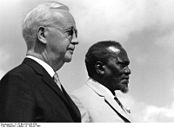 UCL alumnus Jomo Kenyatta (right), considered modern Kenya's founding father
UCL alumnus Jomo Kenyatta (right), considered modern Kenya's founding father
State/Government Leader Office  Council of Europe
Council of EuropeTerry Davis Secretary General of the Council of Europe (2004–2009)  India
IndiaMahatma Gandhi Pre-eminent political and spiritual leader until his death in 1948  Israel
IsraelChaim Herzog Sixth President (1983–1993)  Japan
JapanItō Hirobumi (伊藤 博文) First and Four-time Prime Minister (1885–1888, 1892–1896, 1898, 1900–1901)  Japan
JapanJunichiro Koizumi (小泉純一郎) Prime Minister (2001–2006)  Kenya
KenyaJomo Kenyatta First Prime Minister and President (1963–1978)  Mauritius
MauritiusSir Seewoosagur Ramgoolam First Prime Minister (1968–1982), and Governor-General (1983–1985)  Republic of China
Republic of ChinaWu Tingfang (伍廷芳) One of first Acting Premiers (May 1917)  Trinidad and Tobago
Trinidad and TobagoSir Ellis Clarke Governor-General (1972–1976), and President (1976–1987) Notable faculty and staff
Notable former UCL faculty and staff include Jocelyn Bell Burnell (co-discoverer of radio pulsars), A. S. Byatt (writer), Ronald Dworkin (philosopher of law and scholar of constitutional law), Sir A.J. Ayer (philosopher), Lucian Freud (painter), Francis Galton (founder of psychometrics and father of fingerprinting), Andrew Huxley (physiologist and biophysicist), Sir Frank Kermode (literary critic), Tomáš Garrigue Masaryk (first President of Czechoslovakia and "Father of the Nation"), John Stuart Mill (philosopher) and George R. Price (population geneticist).
All five of the naturally occurring noble gases were discovered at UCL by Sir William Ramsay, who was a professor of chemistry and after whom Ramsay Hall is named.[104]
UCL in fiction
Main article: Filming at UCLDue to its position within London and the historical nature of its buildings, including most notably the UCL Main Building and quad, UCL has been used as a location for a number of film and television productions, including Doctor in the House (1954), Gladiator (2000), The Dark Knight (2008) and Inception (2010).[105]
See also
References
- ^ a b c "Table 0a – All students by institution, mode of study, level of study, gender and domicile 2005/06". Higher Education Statistics Agency online statistics. Archived from the original on 15 May 2007. http://web.archive.org/web/20070515172721/http://www.hesa.ac.uk/holisdocs/pubinfo/student/institution0506.htm. Retrieved 31 March 2007.
- ^ "Profile: University College London". The Times (UK). 1 June 2009. http://www.timesonline.co.uk/tol/life_and_style/education/good_university_guide/article2166791.ece. Retrieved 2 September 2010.
- ^ a b c d "UCL | Fulbright University Partners | US-UK Fulbright Commission". Fulbright.co.uk. http://www.fulbright.co.uk/fulbright-awards/for-us-citizens/postgraduate-student-awards/university-partners/ucl. Retrieved 26 April 2010.
- ^ a b Carvel, John (7 August 2008). "NHS hospitals to forge £2bn research link-up with university". The Guardian (London). http://www.guardian.co.uk/society/2008/aug/07/health.highereducation. Retrieved 15 September 2010.
- ^ "The Most-Cited Institutions Overall, 1999–2009". Thomson Reuters. http://sciencewatch.com/inter/ins/09/09Top20Overall/. Retrieved 9 October 2010.
- ^ "Wealth and Health: Financial data for UK higher education institutions, 2009–10". Times Higher Education. 7 April 2011. http://www.timeshighereducation.co.uk/story.asp?sectioncode=26&storycode=415728&c=2. Retrieved 10 April 2011.
- ^ a b "Key Facts and Figures". University College London. http://www.ucl.ac.uk/about-ucl/about-ucl-home/facts-figs. Retrieved 14 September 2010.
- ^ a b c "Nobel Laureates & Scholarship". University College London. http://www.ucl.ac.uk/research/excellence/nobel. Retrieved 20 January 2011.
- ^ a b "ARWU 2011". Academic Ranking of World Universities – 2011. http://www.shanghairanking.com/ARWU2011.html. Retrieved 15 August 2011.
- ^ a b c d "QS World University Rankings 2011/12". Quacquarelli Symonds. http://www.topuniversities.com/university-rankings/world-university-rankings/2011. Retrieved 16 September 2011.
- ^ a b "Top 400". Times Higher Education. http://www.timeshighereducation.co.uk/world-university-rankings/2011-2012/top-400.html#uni-980. Retrieved 6 October 2011.
- ^ http://www.ucl.ac.uk/images/Uni-Lon.pdf
- ^ "Golden opportunities". Nature. 6 July 2005. http://www.nature.com/naturejobs/2005/050707/full/nj7047-144a.html. Retrieved 19 October 2010.
- ^ "History". Ucl.ac.uk. http://www.ucl.ac.uk/about-ucl/about-ucl-home/history-page. Retrieved 22 April 2011.
- ^ "UCL Bentham Project". Ucl.ac.uk. 2 April 2009. http://www.ucl.ac.uk/Bentham-Project/info/jb.htm. Retrieved 26 April 2010.[dead link]
- ^ a b "Landmarks". Ucl.ac.uk. Archived from the original on 30 January 2008. http://web.archive.org/web/20080130051135/http://www.ucl.ac.uk/about-ucl/history/landmarks. Retrieved 26 April 2010.
- ^ "About Us". UCL Partners. http://www.uclpartners.com/about-us. Retrieved 19 September 2010.
- ^ "UCL School of Energy & Resources, Australia, to be established'". UCL News. 29 May 2008. http://www.ucl.ac.uk/news/news-articles/0805/08052901. Retrieved 1 August 2008.
- ^ http://www.yale-ucl.org/news/transatlantic/index.aspx
- ^ http://www.timeshighereducation.co.uk/story.asp?sectioncode=26&storycode=416795&c=1
- ^ "Students stage day of protests over tuition fee rises". BBC News. 24 November 2010. http://www.bbc.co.uk/news/education-11829102. Retrieved 13 December 2010.
- ^ a b "University College London granted eviction order". BBC News. 8 December 2010. http://www.bbc.co.uk/news/uk-england-london-11954418. Retrieved 13 December 2010.
- ^ http://www.ucl.ac.uk/news/news-articles/1105/11051201
- ^ "Campus location maps, University College London". Ucl.ac.uk. Archived from the original on 26 June 2008. http://web.archive.org/web/20080626234724/http://www.ucl.ac.uk/about-ucl/location/maps. Retrieved 26 April 2010.
- ^ Cunningham, John (16 April 2009). "Energy boost". London: Times Higher Education. http://www.guardian.co.uk/society/2001/jan/10/voluntarysector.publicsectorcareers1. Retrieved 14 October 2010.
- ^ "Welcome to the new frontier – Central Asia". The Independent (London). 9 July 2009. http://www.independent.co.uk/news/education/higher/welcome-to-the-new-frontier-ndash-central-asia-1737516.html. Retrieved 26 October 2010.
- ^ Degree Awarding, University College London[dead link]
- ^ "UCL Provost and President". Ucl.ac.uk. http://www.ucl.ac.uk/provost/. Retrieved 26 April 2010.
- ^ "UCL Faculties". UCL. http://www.ucl.ac.uk/departments/faculties. Retrieved 19 September 2011.
- ^ a b c d "Annual Report and Financial Statements for the year ended 31 July 2010". UCL. http://www.ucl.ac.uk/finance/report_account_arch/report_accounts2009-10.pdf. Retrieved 20 October 2011.
- ^ "Crest – The Student Room". Thestudentroom.co.uk. http://www.thestudentroom.co.uk/showthread.php?t=506124. Retrieved 26 April 2010.
- ^ "logobig on Flickr – Photo Sharing!". Flickr.com. 30 July 2007. http://www.flickr.com/photos/guyfwoodward/950670333/. Retrieved 26 April 2010.
- ^ From Virgil, Storr, Francis, ed. (in Latin), The Aeneid, http://www.archive.org/details/theaeneid00virguoft
- ^ a b "Facts and Figures". UCL. Archived from the original on 22 August 2008. http://web.archive.org/web/20080822212403/http://www.ucl.ac.uk/about-ucl/facts. Retrieved 27 August 2010.
- ^ "The Grand Challenges". University College London. http://www.ucl.ac.uk/grand-challenges/. Retrieved 27 February 2011.
- ^ "UCL tops the THE league table in research grant wins". University College London. 3 September 2009. http://www.ucl.ac.uk/silva/news/news-articles/0909/09090301. Retrieved 27 February 2011.
- ^ http://www.scimagoir.com/pdf/sir_2010_world_report.pdf
- ^ [1]
- ^ "Research powerhouse: UCL top-cited in UK". Ucl.ac.uk. http://www.ucl.ac.uk/news/news-articles/0807/08071504. Retrieved 26 April 2010.
- ^ "Top European universities in Engineering". Times Higher Education. 18 November 2010. http://www.timeshighereducation.co.uk/story.asp?storycode=414302. Retrieved 26 November 2010.
- ^ "UCL Medical School". Ucl.ac.uk. 17 February 2010. http://www.ucl.ac.uk/medicalschool/about-medicalschool. Retrieved 26 April 2010.
- ^ "Biomedical Research Centres". National Institute for Health Research. http://www.nihr.ac.uk/infrastructure/Pages/infrastructure_biomedical_research_centres.aspx. Retrieved 15 September 2010.
- ^ Jha, Alok (19 June 2010). "Plans for largest biomedical research facility in Europe unveiled". The Guardian (London). http://www.guardian.co.uk/science/2010/jun/19/largest-biomedical-research-facility-europe. Retrieved 15 September 2010.
- ^ "Project Press Release". UK Centre for Medical Research and Innovation web site. 21 June 2010. http://www.ukcmri.ac.uk/news/press-releases/unprecedented-step. Retrieved 11 August 2010.
- ^ . http://www.ucl.ac.uk/language-centre/preparatory-certificates.
- ^ "Mathematics: Undergraduate Prospectus 2010: Prospective Students". UCL. 15 March 2010. http://www.ucl.ac.uk/prosp-students/prospectus/maps/mathematics/. Retrieved 26 April 2010.
- ^ "UK | Education | Cambridge entry level is now A*AA". BBC News. 16 March 2009. http://news.bbc.co.uk/1/hi/education/7946675.stm. Retrieved 26 April 2010.
- ^ a b "Academic Ranking of World Universities 2011". Shanghai Ranking Consultancy. http://www.shanghairanking.com/ARWU2011.html. Retrieved 17 September 2011.
- ^ a b "Top European Universities 2011". Times Higher Education. http://www.timeshighereducation.co.uk/world-university-rankings/2011-2012/europe.html. Retrieved 7 October 2011.
- ^ "University League Table 2012". The Complete University Guide. http://www.thecompleteuniversityguide.co.uk/league-tables/rankings. Retrieved 16 September 2011.
- ^ "University guide 2012: University league table". The Guardian. 17 May 2011. http://www.guardian.co.uk/education/table/2011/may/17/university-league-table-2012. Retrieved 16 September 2011.
- ^ "The Sunday Times University Guide 2012". Times Newspapers. http://www.thesundaytimes.co.uk/sto/. Retrieved 18 September 2011.(subscription required)
- ^ "The Times Good University Guide 2012". Times Newspapers. http://extras.thetimes.co.uk/public/good_university_guide_landing?CMP=KNGvccp1-the+times+university+rankings. Retrieved 17 September 2011.(subscription required)
- ^ "AWRU in Clinical Medicine and Pharmacy". Academic Ranking of World Universities – 2011. http://www.shanghairanking.com/FieldMED2011.html. Retrieved 15 August 2011.
- ^ "Life and Agriculture Sciences". Academic Ranking of World Universities – 2011. http://www.shanghairanking.com/FieldLIFE2011.html. Retrieved 15 August 2011.
- ^ "Arts and Humanities". QS Quacquarelli Symonds Limited. http://www.topuniversities.com/university-rankings/world-university-rankings/2011/faculty-area-rankings/arts-humanities. Retrieved 19 September 2011.
- ^ "Engineering & Technology". QS Quacquarelli Symonds Limited. http://www.topuniversities.com/university-rankings/world-university-rankings/2011/faculty-area-rankings/technology. Retrieved 19 September 2011.
- ^ "Life Sciences and Medicine". QS Quacquarelli Symonds Limited. http://www.topuniversities.com/university-rankings/world-university-rankings/2011/faculty-area-rankings/life-science-biomedicine. Retrieved 19 September 2011.
- ^ "Natural Sciences". QS Quacquarelli Symonds Limited. http://www.topuniversities.com/university-rankings/world-university-rankings/2011/faculty-area-rankings/natural-sciences. Retrieved 19 September 2011.
- ^ "Social Sciences & Management". QS Quacquarelli Symonds Limited. http://www.topuniversities.com/university-rankings/world-university-rankings/2011/faculty-area-rankings/social-science. Retrieved 19 September 2011.
- ^ "Top 50 Arts and Humanities universities 2011-2012". Times Higher Education. http://www.timeshighereducation.co.uk/world-university-rankings/2011-2012/arts-and-humanities.html. Retrieved 18 November 2011.
- ^ "Top 50 Clinical, Pre-Clinical and Health Universities 2011-2012". Times Higher Education. http://www.timeshighereducation.co.uk/world-university-rankings/2011-2012/clinical-pre-clinical-health.html. Retrieved 18 November 2011.
- ^ "Top 50 Engineering and Technology universities 2011-2012". Times Higher Education. http://www.timeshighereducation.co.uk/world-university-rankings/2011-2012/engineering-and-IT.html. Retrieved 18 November 2011.
- ^ "Top 50 Life Sciences universities 2011-2012". Times Higher Education. http://www.timeshighereducation.co.uk/world-university-rankings/2011-2012/life-sciences.html. Retrieved 18 November 2011.
- ^ "Top 50 Physical Sciences universities 2011-2012". Times Higher Education. http://www.timeshighereducation.co.uk/world-university-rankings/2011-2012/physical-sciences.html. Retrieved 18 November 2011.
- ^ "Top 50 Social Sciences universities 2011-2012". Times Higher Education. http://www.timeshighereducation.co.uk/world-university-rankings/2011-2012/social-sciences.html. Retrieved 18 November 2011.
- ^ "Top Universities by Reputation 2011". Times Higher Education. http://www.timeshighereducation.co.uk/world-university-rankings/2010-2011/reputation-rankings.html. Retrieved 15 March 2011.
- ^ "University guide 2011 subjects". The Guardian (London). 8 June 2010. http://www.guardian.co.uk/education/series/university-guide-2011-subjects. Retrieved 14 September 2010.
- ^ "300 Best World Universities 2011". ChaseCareer Network. http://www.chasecareer.net/news_detail.php?id=61.
- ^ The Guardian (London). http://image.guardian.co.uk/sys-files/Education/documents/2009/08/20/ReputationRankings2009in.pdf.
- ^ The New York Times (New York). http://graphics8.nytimes.com/images/2011/10/20/education/20iht-SReducEmploy20-graphic/20iht-SReducEmploy20-graphic-popup.jpg.
- ^ a b c d "Sites & opening hours". UCL Library Services. http://www.ucl.ac.uk/library/sites.shtml. Retrieved 29 September 2010.
- ^ "eUCLid library catalogue". UCL Library Services. http://www.ucl.ac.uk/library/catalogue.shtml. Retrieved 29 September 2010.
- ^ a b "Review of HEFCE funding for research libraries". Higher Education Funding Council for England. http://www.hefce.ac.uk/pubs/rdreports/2008/rd04_08/rd04_08.pdf. Retrieved 29 September 2010.
- ^ "Libraries". University of London Research Library Services. http://www.ulrls.lon.ac.uk/libraries/index.asp. Retrieved 29 September 2010.
- ^ a b "About UCL Eprints". UCL Library Services. http://eprints.ucl.ac.uk/information.html. Retrieved 29 September 2010.
- ^ "UCL Eprints repository rankings". University College London. http://www.ucl.ac.uk/news/news-articles/0803/08031304. Retrieved 29 September 2010.
- ^ "UCL Library Services – Special Collections Library". Ucl.ac.uk. 22 January 2010. http://www.ucl.ac.uk/Library/special-coll/index.shtml. Retrieved 26 April 2010.
- ^ "UCL Library Services – Special Collections A-Z Directory". Ucl.ac.uk. 8 September 2008. http://www.ucl.ac.uk/Library/special-coll/azdirect.shtml. Retrieved 26 April 2010.
- ^ "UCL Library Services – Special Collections Library". Ucl.ac.uk. 22 January 2010. http://www.ucl.ac.uk/Library/special-coll/index.shtml#news. Retrieved 26 April 2010.
- ^ "UCL Library Services – Special Collections Library". Ucl.ac.uk. 10 February 2005. http://www.ucl.ac.uk/Library/special-coll/srbooks.shtml. Retrieved 26 April 2010.
- ^ "UCL Museums & Collections | Home". Ucl.ac.uk. http://www.ucl.ac.uk/museums/. Retrieved 26 April 2010.
- ^ "Welcome to The Petrie Museum of Egyptian Archaeology". Petrie.ucl.ac.uk. http://www.petrie.ucl.ac.uk/. Retrieved 26 April 2010.
- ^ "UCL Museums & Collections". Grant.museum.ucl.ac.uk. http://www.grant.museum.ucl.ac.uk/. Retrieved 26 April 2010.
- ^ "UCL Museums & Collections". Ucl.ac.uk. http://www.ucl.ac.uk/museums/geology. Retrieved 26 April 2010.
- ^ "UCL Museums & Collections". Ucl.ac.uk. http://www.ucl.ac.uk/museums/uclart. Retrieved 26 April 2010.
- ^ "UCL Museums & Collections". Ucl.ac.uk. http://www.ucl.ac.uk/museums/archaeology. Retrieved 26 April 2010.
- ^ "UCL Museums & Collections". Ucl.ac.uk. http://www.ucl.ac.uk/museums/ethno. Retrieved 26 April 2010.
- ^ "UCL Museums & Collections | Home". Ucl.ac.uk. http://www.ucl.ac.uk/museums/galton. Retrieved 26 April 2010.
- ^ "UCL Museums & Collections". Ucl.ac.uk. http://www.ucl.ac.uk/museums/sciences. Retrieved 26 April 2010.
- ^ "The John Flaxman Collection". UCL Museums & Collections. http://www.ucl.ac.uk/museums/uclart/collections/collections/flaxman. Retrieved 29 September 2010.
- ^ "UCL Union". UCL Union. 13 April 2010. http://www.uclunion.org/index.php. Retrieved 26 April 2010.
- ^ "About UCL Union". University College London Union. http://www.ucl.ac.uk/silva/cbrc. Retrieved 26 May 2011.
- ^ "University College London student publications – Home". Pi Media. http://www.pimedia.org.uk. Retrieved 14 December 2010.
- ^ "Accommodation". Ucl.ac.uk. http://www.ucl.ac.uk/prospective-students/accommodation/. Retrieved 26 April 2010.
- ^ "University of London – Intercollegiate Halls". Lon.ac.uk. 26 March 2010. http://www.lon.ac.uk/halls.html. Retrieved 26 April 2010.
- ^ "Mayhem in the Metropolis: King's College versus University College in Student Rags". Kcl.ac.uk. http://www.kcl.ac.uk/depsta/iss/archives/rag/. Retrieved 26 April 2010.
- ^ "Mayhem in the Metropolis: King's College versus University College in Student Rags". Kcl.ac.uk. http://www.kcl.ac.uk/depsta/iss/archives/rag/rag05.htm. Retrieved 26 April 2010.
- ^ "Mayhem in the Metropolis: King's College versus University College in Student Rags". Kcl.ac.uk. http://www.kcl.ac.uk/depsta/iss/archives/rag/rag04.htm. Retrieved 26 April 2010.
- ^ [2][dead link]
- ^ "Facts and Figures". Ucl.ac.uk. Archived from the original on 22 August 2008. http://web.archive.org/web/20080822212403/http://www.ucl.ac.uk/about-ucl/facts. Retrieved 26 April 2010.
- ^ "20th Nobel Prize for UCL community". Ucl.ac.uk. 8 October 2007. http://www.ucl.ac.uk/news/news-articles/0710/07100801. Retrieved 26 April 2010.
- ^ "Spotted: Alumni in the Public Eye". UCL Department of Philosphy. http://www.ucl.ac.uk/philosophy/former-students/alumni-spotted.htm. Retrieved 16 January 2011.
- ^ "Sir William Ramsay: Noble Gas Pioneer—On the 100th Anniversary of His Nobel Prize". Chemeducator.org. http://chemeducator.org/sbibs/s0009006/spapers/960378gk.htm. Retrieved 26 April 2010.
- ^ "Nolan's Mind Games". Film London. 14 July 2010. http://filmlondon.org.uk/news/2010/july/nolans_mind_games. Retrieved 11 August 2010.
External links
- University of London
- University College London
- University College London Hospitals
- UCL Union
- University of London Union
- Pi Media (UCL student publications)
- University of London Student Records
- Lists of University College London military personnel,1914–1918
- UCL on You Tube
Links to related articles University of London Colleges and institutions CurrentBirkbeck · Central School of Speech and Drama · Courtauld Institute of Art · Goldsmiths · Heythrop College · Institute of Cancer Research · Institute of Education · King's College London · London Business School · London School of Economics and Political Science · London School of Hygiene & Tropical Medicine · Queen Mary · Royal Academy of Music · Royal Holloway · Royal Veterinary College · St. George's · School of Oriental and African Studies · School of Pharmacy · University College LondonFormer and defunctBedford College · Chelsea College of Science and Technology · Imperial College London · New College London · Queen Elizabeth College · Regent's Park College · Royal Postgraduate Medical School · School of Slavonic and East European Studies · St Thomas's Hospital Medical School · Westfield College · Wye College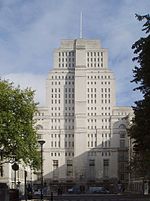
Central bodies and
programmesLondon Consortium · Senate House Libraries · School of Advanced Study (Institute of Advanced Legal Studies · Institute of Classical Studies · Institute of Commonwealth Studies · Institute of English Studies · Institute of Germanic and Romance Studies · Institute of Historical Research · Institute of Musical Research · Institute of Philosophy · Institute for the Study of the Americas · Warburg Institute) · University of London Institute in Paris · University of London International Programmes · University Marine Biological Station MillportPeople Academics · Alumni · Chancellor: HRH The Princess Royal · Heads of Colleges · Vice-Chancellor: Professor Geoffrey Crossick · Visitor: Nick CleggPlaces and buildings 6 Burlington Gardens · Bloomsbury · Church of Christ the King · Gordon Square · Halls of residence (Commonwealth Hall · Connaught Hall · Hughes Parry Hall · International Hall · Nutford House) · Malet Street · Russell Square · Senate House · Torrington SquareOther Academic dress · The Careers Group · History · London Student · University of London Big Band · University of London Boat Club · University of London Computer Centre · University of London Union · Parliamentary Constituency (Abolished)
UCL Partners Founder members Great Ormond Street Hospital for Children NHS Trust · Moorfields Eye Hospital NHS Foundation Trust · Royal Free Hampstead NHS Trust · University College London · University College London Hospitals NHS Foundation TrustExecutive members Francis Crick Institute Partners Cancer Research UK · Imperial College London · King's College London · Medical Research Council · University College London · Wellcome TrustOther Universities and colleges in London Universities Birkbeck · Central School of Speech and Drama · Courtauld Institute of Art · Goldsmiths · Heythrop College · Institute of Cancer Research · Institute of Education · King's College London · London Business School · London School of Economics · London School of Hygiene & Tropical Medicine · Queen Mary · Royal Academy of Music · Royal Holloway · Royal Veterinary College · St George's · School of Oriental and African Studies · School of Pharmacy · University College London
Central Bodies: School of Advanced Study · University of London Institute in Paris · University Marine Biological Station, MillportOtherUniversity of the Arts London · Brunel University · City University London · University of East London · University of Greenwich · Kingston University · Imperial College London · London Metropolitan University · London South Bank University · Middlesex University · Roehampton University · Royal College of Art · University of Westminster · University of West LondonUniversity colleges BPP University College of Professional Studies · St. Mary'sOther university level colleges Further Education colleges Barking & Dagenham · Barnet · Bexley · Bromley · Capel Manor · Carshalton · City & Islington · City Lit · City of Westminster · Croydon · Ealing, Hammersmith & West London · Greenwich · Hackney · Haringey, Enfield & North East London · Harrow · Havering · Hillcroft · Kensington & Chelsea · Kingston · Lambeth · Lewisham · Marine Society · Mary Ward · Morley · Newham · North West London · Orpington · Redbridge · Richmond Adult · Richmond upon Thames · South Thames · Southgate · Southwark · Stanmore · Tower Hamlets · Uxbridge · Waltham Forest · West Thames · Westminster Kingsway · Working Men'sSixth form colleges BSix · Christ the King · Crossways · Coulsdon · Havering · John Ruskin · Lansdowne College · La Swap · Leyton · Newham · St Charles · St Dominic's · St Francis Xavier · Sir George Monoux · Woodhouse · Valentines · Seven Kings Universities in the United Kingdom
Universities in the United KingdomEngland LondonBirkbeck · CSSD · Courtauld · Goldsmiths · Heythrop · ICR · IoE · King's · LBS · LSE · LSHTM · Queen Mary · Royal Academy of Music · Royal Holloway · RVC · St George's · SOAS · School of Pharmacy · UCLOtherBrunel · City · East London · Greenwich · Kingston · Imperial · London Met · London South Bank · Middlesex · RCA · Roehampton · UAL · Westminster · West LondonMidlandsAston · Birmingham · Birmingham City · Coventry · De Montfort · Derby · Keele · Leicester · Lincoln · Loughborough · Northampton · Nottingham · Nottingham Trent · Staffordshire · Warwick · Wolverhampton · WorcesterNorthBolton · Bradford · Central Lancashire · Chester · Cumbria · Durham · Edge Hill · Huddersfield · Hull · Lancaster · Leeds · Leeds Metropolitan · Liverpool · Liverpool Hope · Liverpool John Moores · Manchester · Manchester Metropolitan · Newcastle · Northumbria · Salford · Sheffield · Sheffield Hallam · Sunderland · Teesside · York · York St. JohnSouthAnglia Ruskin · Bath · Bath Spa · Bedfordshire · Bournemouth · Brighton · Bristol · Buckingham · Buckinghamshire New · Cambridge · Canterbury Christ Church · Chichester · Cranfield · Creative Arts · East Anglia · Essex · Exeter · Gloucestershire · Hertfordshire · Kent · Oxford · Oxford Brookes · Plymouth · Portsmouth · Reading · Southampton · Southampton Solent · Surrey · Sussex · UWE · WinchesterNorthern Ireland Scotland Aberdeen · Abertay Dundee · Dundee · Edinburgh · Edinburgh Napier · Glasgow · Glasgow Caledonian · Heriot-Watt · Highlands and Islands · Queen Margaret · Robert Gordon · RCS · St Andrews · Stirling · Strathclyde · UWSWales Aberystwyth · Bangor · Cardiff · Cardiff Metropolitan · Glamorgan · Glyndŵr · Newport · Swansea · Swansea Metropolitan · Trinity Saint DavidNon−geographic University colleges Birmingham · Bishop Grosseteste Lincoln · Bournemouth · BPP · Falmouth · Harper Adams · Leeds Trinity · NCH · Newman · Norwich · Plymouth St Mark & St John · St. Mary's (Belfast) · St. Mary's (Twickenham) · Stranmillis · SuffolkUniversity centres Related League of European Research Universities Amsterdam · Barcelona · Cambridge · Edinburgh · Freiburg · Geneva · Heidelberg · Helsinki · Imperial College · Karolinska · Leiden · Leuven · Lund · Milan · LMU Munich · Oxford · Paris VI · Paris XI · Strasbourg · University College London · Utrecht · Zürich
Russell Group of UK research universities Birmingham · Bristol · Cambridge · Cardiff · Edinburgh · Glasgow · Imperial College London · King's College London · Leeds · Liverpool · London School of Economics · Manchester · Newcastle · Nottingham · Oxford · Queen's · Sheffield · Southampton · University College London · WarwickInstitutional Network of the Universities from the Capitals of Europe (UNICA) Amsterdam (UvA) · Athens · Belgrade · Berlin (FUB) · Berlin (HUB) · Bratislava · Brussels (VUB) · Brussels (ULB) · Bucharest · Budapest · Copenhagen · Dublin (UCD) · Helsinki · Lausanne · Lisboa · Ljubljana · London (UCL) · Madrid (UAM) · Madrid (UCM) · Moscow · Nicosia · Oslo · Paris I · Paris III · Paris VI · Paris-Dauphine · Prague · Riga · Rome-La Sapienza · Rome-Tor Vergata · Rome-Tre · Skopje · Sofia · Stockholm · Tallinn (TU) · Tallinn (TUT) · Tirana · Vienna · Vilnius · Warsaw · Zagreb
Coordinates: 51°31′29.24″N 00°08′00.88″W / 51.5247889°N 0.1335778°W
Categories:- University College London
- University of London
- Universities in London
- Russell Group
- Association of Commonwealth Universities
- Educational institutions established in 1826
- Grade I listed educational buildings
- Grade I listed buildings in London
- Domes
- 1826 establishments in England
Wikimedia Foundation. 2010.

